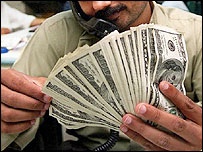Hawala Far Swifter Than SWIFT
Transnational terrorists have studiously avoided
getting tangled in the ones and zeros of electronic interception in favor of a
time-honored, time-tested, interception-proof system known as
Hawala.
It’s an informal funds transfer mechanism, swifter than SWIFT that leaves
no paper or digital trail.

President Bush was swift to react angrily against the New York Times for exposing U.S. monitoring of SWIFT (Society for Worldwide Interbank Financial Telecommunications) as a suspected conduit for the transfer of terrorist funds. Former Attorney General Edwin Meese accused the newspaper of giving “aid and comfort to the enemy,” which is tantamount to treason. Belgian and European authorities also reacted angrily against the Bush administration for tapping SWIFT’s Belgian-based supercomputers without the green light of a Belgian judge. The hullabaloo generated much heat and little light.
President Bush’s denunciation of the New York Times seemed a tad hyperbolic. Transnational terrorists have studiously avoided getting tangled in the ones and zeros of electronic interception in favor of a time-honored, time-tested, interception-proof system known as Hawala (Arabic for “transfer” or “wire”). It’s an informal funds transfer (IFT) mechanism, swifter than SWIFT that leaves no paper or digital trail.
I first used Hawala fifty years ago. It’s always been fast and secure.
It is based entirely on trust between two individuals separated by thousands of miles. Hawala is much faster than a normal bank transfer. Originally devised as protection against the dangers of traveling with gold and precious stones and other forms of payment on roads prowled by bandits, today’s system is transnational.
How would an al-Qaida operative transfer funds from, say, Quetta in Baluchistan, to Queens in New York? He/she would hand a specific amount to a “hawaladar” who then calls a trusted friend at the other end of the transaction to hand over the equivalent amount to the person (man, woman or child) who gives him the coded word or phrase already mentioned, either by e-mail, fax or phone, or VOIA (voice over internet protocol).
Two hawaladars who work together — with two-way traffic — settle up their accounts at the end of a fiscal year. If one owes the other more than he/she transferred, the balance is frequently settled by putting something of value in a bank’s safe deposit box, or in goods and services. Hawaladars charge lower than bank fees and use the exchange rate spread between countries to generate more income. The system is also used for settling debts through import-export transactions.
The saddest comment is that if we could place half as much trust in our politicians, we’d be ahead of the game.
Posted: Fri - June 30, 2006 at 08:04 AM